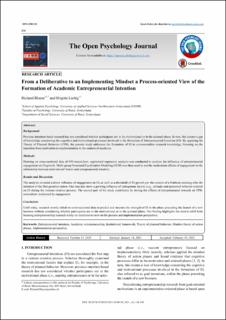Please use this identifier to cite or link to this item:
https://doi.org/10.21256/zhaw-24371Full metadata record
| DC Field | Value | Language |
|---|---|---|
| dc.contributor.author | Blaese, Richard | - |
| dc.contributor.author | Liebig, Brigitte | - |
| dc.date.accessioned | 2022-03-02T09:24:53Z | - |
| dc.date.available | 2022-03-02T09:24:53Z | - |
| dc.date.issued | 2021-08 | - |
| dc.identifier.issn | 1874-3501 | de_CH |
| dc.identifier.uri | https://digitalcollection.zhaw.ch/handle/11475/24371 | - |
| dc.description.abstract | Background: Previous intention-based research has not considered whether participants are in the motivational or in the actional phase. In turn, this creates a gap of knowledge concerning the cognitive and motivational processes involved in the formation of Entrepreneurial Intention (EI). By applying the Theory of Planned Behavior (TPB), the present study addresses the formation of EI to commercialize research knowledge, focusing on the transition from motivation to implementation in the context of academia. Methods: Drawing on cross-sectional data of 490 researchers, segmented regression analysis was conducted to analyze the influence of entrepreneurial engagement on EI-growth. Multi-group Structural Equalization Modeling (SEM) was then used to test the moderation effects of engagement on the relationship between motivational factors and entrepreneurial intention. Results and Discussion: The analysis revealed a direct influence of engagement on EI, as well as a threshold of EI-growth per the context of a Rubicon crossing after the initiation of the first gestation action. Our data also show a growing influence of endogenous factors (e.g., attitudes and perceived behavior control) on EI during the venture creation process. The second part of the study contributes by testing the effects of entrepreneurial rewards on TPB-antecedents moderated by engagement. Conclusion: Until today, research mostly relied on cross-sectional data to predict and measure the strength of EI in the phase preceding the launch of a new business without considering whether participants are in the motivational or in the actional phase. Our finding highlights the need to shift from focusing entrepreneurship research solely on intentions to now on the process and implementation perspective. | de_CH |
| dc.language.iso | en | de_CH |
| dc.publisher | Bentham Open | de_CH |
| dc.relation.ispartof | The Open Psychology Journal | de_CH |
| dc.rights | https://creativecommons.org/licenses/by/4.0/ | de_CH |
| dc.subject | Entrepreneurial intention | de_CH |
| dc.subject | Academic entrepreneurship | de_CH |
| dc.subject | Institutional framework | de_CH |
| dc.subject | Theory of planned behavior | de_CH |
| dc.subject | Mindset theory of action phases | de_CH |
| dc.subject | Implementation perspective | de_CH |
| dc.subject.ddc | 338: Produktion | de_CH |
| dc.subject.ddc | 658.4: Leitendes Management | de_CH |
| dc.title | From a deliberative to an implementing mindset : a process-oriented view of the formation of academic Entrepreneurial Intention | de_CH |
| dc.type | Beitrag in wissenschaftlicher Zeitschrift | de_CH |
| dcterms.type | Text | de_CH |
| zhaw.departement | School of Management and Law | de_CH |
| zhaw.organisationalunit | Center for Corporate Responsibility (CCR) | de_CH |
| dc.identifier.doi | 10.2174/1874350102114010134 | de_CH |
| dc.identifier.doi | 10.21256/zhaw-24371 | - |
| zhaw.funding.eu | No | de_CH |
| zhaw.originated.zhaw | Yes | de_CH |
| zhaw.pages.end | 149 | de_CH |
| zhaw.pages.start | 134 | de_CH |
| zhaw.publication.status | publishedVersion | de_CH |
| zhaw.volume | 14 | de_CH |
| zhaw.publication.review | Peer review (Publikation) | de_CH |
| zhaw.author.additional | No | de_CH |
| zhaw.display.portrait | Yes | de_CH |
| Appears in collections: | Publikationen School of Management and Law | |
Files in This Item:
| File | Description | Size | Format | |
|---|---|---|---|---|
| 2021_Blaese-Liebig_Process-oriented-view-academic-entrepreneurial-mindset.pdf | 666.11 kB | Adobe PDF |  View/Open |
Show simple item record
Blaese, R., & Liebig, B. (2021). From a deliberative to an implementing mindset : a process-oriented view of the formation of academic Entrepreneurial Intention. The Open Psychology Journal, 14, 134–149. https://doi.org/10.2174/1874350102114010134
Blaese, R. and Liebig, B. (2021) ‘From a deliberative to an implementing mindset : a process-oriented view of the formation of academic Entrepreneurial Intention’, The Open Psychology Journal, 14, pp. 134–149. Available at: https://doi.org/10.2174/1874350102114010134.
R. Blaese and B. Liebig, “From a deliberative to an implementing mindset : a process-oriented view of the formation of academic Entrepreneurial Intention,” The Open Psychology Journal, vol. 14, pp. 134–149, Aug. 2021, doi: 10.2174/1874350102114010134.
BLAESE, Richard und Brigitte LIEBIG, 2021. From a deliberative to an implementing mindset : a process-oriented view of the formation of academic Entrepreneurial Intention. The Open Psychology Journal. August 2021. Bd. 14, S. 134–149. DOI 10.2174/1874350102114010134
Blaese, Richard, and Brigitte Liebig. 2021. “From a Deliberative to an Implementing Mindset : A Process-Oriented View of the Formation of Academic Entrepreneurial Intention.” The Open Psychology Journal 14 (August): 134–49. https://doi.org/10.2174/1874350102114010134.
Blaese, Richard, and Brigitte Liebig. “From a Deliberative to an Implementing Mindset : A Process-Oriented View of the Formation of Academic Entrepreneurial Intention.” The Open Psychology Journal, vol. 14, Aug. 2021, pp. 134–49, https://doi.org/10.2174/1874350102114010134.
Items in DSpace are protected by copyright, with all rights reserved, unless otherwise indicated.